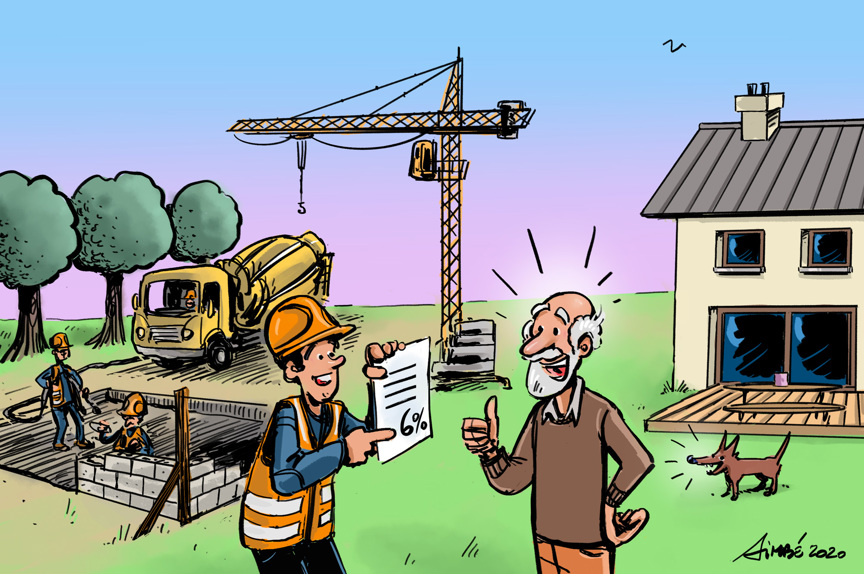- Construction Law , Real Estate, Renting and Co-ownership
- Casper Boudry - Peter Moerman
- VAT , VAT regime , demolition and reconstruction projects , demolition , reconstruction , renovation , reduced VAT rate of 6% , property developers , turnkey companies , private investors , first private house , 32 centre cities
When finalizing the budget of 2023, the government sealed the fate of the VAT regime regarding demolition and reconstruction of buildings.
Residential projects, in which an existing building is demolished to subsequently build a new residential unit, will continue to benefit from a reduced VAT rate of 6% under certain conditions.

For property developers, turnkey companies and private investors who realise projects that do not meet these conditions, it will probably be the end of the story. They will in principle fall under the 21% VAT regime for their projects in the 32 centre cities as well. However, this abolition should be nuanced taking into account the transitional regime of the new regulations.
We hereby give you an overview of the main, new developments, as they were currently communicated in the run-up to the official text, which is currently not yet finalised. We therefore have to make some reservations about the information in this article and we will keep you informed as soon as the official final text is published.
We will discuss hereafter to two topics:
- The temporary extension of the favourable VAT scheme for demolition and renovation for the private first home;
- The abolition of the favourable VAT scheme in the 32 centre cities.
Other favourable VAT schemes for social housing, as well as for the installation of solar panels, solar boilers and heat pumps, are not discussed in detail in this article.
1. A temporary extension of the favourable VAT scheme for demolition and renovation?
1.1. What is covered by the favourable VAT scheme?
If, within a residential project, a property is completely demolished and a new residential unit is built, the construction cost will be able to be invoiced at a reduced VAT rate of 6%.
This favourable rate was introduced in 2021 for a period of two years with a possible additional one-year extension. The rule was initially made permanent for 32 central cities until the federal government opted to extend it to the rest of the country, albeit with stricter conditions.
1.2. What conditions?
To benefit from the 6% VAT rate, the project must meet some conditions.
First and foremost, the demolition of the property must go hand in hand with its reconstruction. The demolition and reconstruction must constitute a single operation.
Furthermore, when put into use, the newly erected structure must be used exclusively or mainly as a single private residence. A mainly private use is sufficient, which means that premises that are partly used professionally will also be covered.
The habitable surface may not exceed 200 m². If this limit is exceeded then the favourable rate will no longer apply.
The conditions must be respected for at least five years. The period runs from the first occupation until 31 December of the fifth subsequent year.
1.3. Extension of the regime through the transitional regime
The favourable regime will be extended for construction projects, which fell under the previous regime and for which the single permit was applied for before 1 July 2023 (the approval is not necessary!).
The invoiced construction cost will still be subject to the 6% VAT regime until the end of 2024 according to the transitional regime announced for these construction projects.
2. Abolition of the favourable VAT regime in 32 centre cities
A permanent favourable VAT regime was in place in 32 centre cities to combat urban decay. Under this, investors were allowed to invoice the construction cost of works in projects, where an existing building was demolished in order to subsequently build a new building on the same site, at a VAT of 6%. However, this VAT preferential regime did not apply to investments in social housing.
A special feature of this regime was that it:
- applied without any additional conditions; and
- only applied in the 32 centre cities in Belgium.
This favourable regime for demolition and reconstruction in the 32 centre cities is likely to be abolished.
However, the abolition will be accompanied by a transitional regime. Real estate works will remain possible with 6% VAT, provided the single permit is applied for before 1 January 2024 and this for works, the payment of which is made on 31 December 2024 at the latest.
However, it remains to be seen whether the legislator will effectively put its money where its mouth is. This abolition was widely criticised from the sector because it has a major impact on the profitability of urban projects.
On top of this, several lobbyers will want to subject the regulations to judicial review. It goes without saying that the outcome of these proceedings may have an impact on the concrete elaboration of the new regulations.
Also, the abolition of the favourable regime will limit the urban development in central cities, which may not be entirely desirable from a political point of view.
3. Conclusion
We can infer from the government's communication that the favourable VAT regimes "first private house" and "32 centre cities" for both demolition and renewal construction will be phased out over time.
Both regimes will continue to be applied until the end of 2024 under specific conditions, after which they are likely to disappear.
The final regulations are likely to follow by the end of this year and will attract a lot of attention in the sector and possibly be contested in court.
Seeds of Law is closely following this legislative process and will report on this as soon as the regulations are finalised.
Would you like more information or assistance from the Seeds of Law specialists? Please do not hesitate to contact us on +32 (0)2 747 40 07 or via info@seeds.law.





